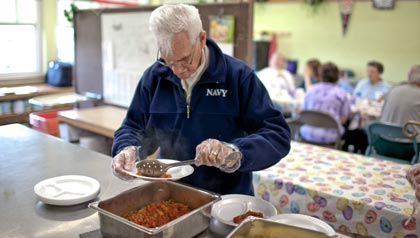AARP Eye Center

FACT SHEET: Funding for Home and Community Based Services
Budget Request: The Lt. Governor’s Office on Aging (LGOA) is requesting $4.7 million in the fiscal year 2014-15 state budget to serve needy seniors in their homes and $3 million in ongoing resources for respite services for caregivers.
Why are these funds needed? Data from the 2010 US Census shows South Carolina’s (SC) senior population has increased by 40%. In the future, many of these seniors will be in need of aging services. The programs and services provided by the LGOA are designed to allow seniors to safely remain at home with independence and good health.
Without the LGOA’s services, seniors could experience declining health by improper nutrition, lack of medication, lack of access to health care services and could experience dangerous falls that require institutionalization. Often these institutional services are paid for by the much more expensive taxpayer funded Medicaid program.
By allowing seniors to remain independent and healthy at home, the LGOA is delaying the need for a more expensive health care delivery system. There are 8,000 seniors on waiting list, and these funds may prevent or delay them becoming Medicaid eligible. This will result in a much lower cost for the State and its taxpayers.
What are home and community based services? Home and community based services (HCBS) prevent or delay frail seniors and persons with disabilities from being admitted to nursing homes. Services include such assistance as personal care aides, adult day services, transportation, home-delivered meals, congregate meals, nutrition education, respite care and other services.
What is respite care? Respite services support the health and well-being of family caregivers of persons with dementia or other debilitating conditions by providing access to short-term respite through in-home care, adult day care or short-term facility stays. Our state ranks 44th in the nation in support for family caregivers, meaning 43 other states do better than SC to help family members who care for their loved ones.
Are our seniors suffering? How do we compare to other states? Yes, according to an August 2011 “Drive to End Hunger” report from the AARP Foundation, many of our seniors are at risk of hunger. SC ranks 4th highest for the number of seniors 60 and older at risk for hunger. According to AARP’s Long Term Services and Supports Scorecard, we are 44th worst of all the states in our support of caregivers. Even with wonderful non-profits such as Meals on Wheels, who do not accept government funding, we cannot keep pace with the serious needs of our seniors.
Who is served? More than 27,000 seniors; 70 percent of these seniors have incomes below the federal poverty level of less than $800 a month. Half of these seniors live alone. Sixty percent live in rural areas and almost 30 percent are 85 and older.
How many seniors are on the waiting list? Almost 8000 frail seniors, but the need is much higher. Some senior organizations do not keep waiting lists because the wait would be too long and would provide false hope to the seniors.
What does it cost us? The range of aging services – home-delivered meals, personal care, adult day services, etc. - that help seniors remain in their home cost an average of $1,318 dollars per individual per year. In contrast, persons in Medicaid-paid nursing home beds cost taxpayers anywhere from $25,000 to $37,000 per year. Investing these dollars can potentially save the state expenditures of more than $30 million in delayed or prevented nursing home admissions over the next few years. Other states have already realized the wisdom of this type of investment and have moved more of their dollars into home- and community-based services.
What are the health benefits of receiving nutrition services, a core component of HCBS? Food insecurity can lead to serious health consequences for older adults. Studies indicate that individuals who go hungry are almost twice as likely to be diabetic, are over five times more likely to suffer from depression, and are more likely to be in only poor or fair health.
What’s a real life example of someone receiving these services? Mrs. R. is 83 years old and lives alone. A few years ago, she was diagnosed with cancer of the salivary gland for which she received surgery and chemotherapy. However, the right side of her face droops because of the muscles that were affected. As a result, she has difficulty eating. In addition, she is legally blind and has macular degeneration. Recently, she had another episode with cancer of the salivary gland. She had surgery and is still receiving chemotherapy. Needless to say, she needs assistance to continue living alone in her own home. Mrs. R. started receiving Home Delivered Meals and Homemaker Services through the local Council on Aging in August 2009. About a year ago, she discontinued the meals because she was having so much difficulty chewing. The Homemaker now helps with the preparation of soft foods, cleans the house, and helps with setting up medical appointments. Without Homemaker Services, she would not be able to remain living alone in her home.
Note: Data not otherwise attributed was received from the Lt. Governor’s Office on Aging.
Who supports additional funding for home and community based services?
AARP South Carolina
Atlantic Healthcare Group
Alzheimer's Association – South Carolina Chapter
Active Day/Senior Care Centers of America
Caring Healthcare – Caring, Inc.
Comfort Home Healthcare
Conway/Loris Adult Day Cares
Golden Care Adult Day Health Services
Health Force, LLC
Hope Bridge/Helping Hands
New Generations Adult Day Care
New Generations Home Care
Nurses on Call
Nightingale's Nursing & Attendant Care
Plan Home Healthcare
Protection and Advocacy for People with Disabilities, Inc.
SC Association of Council on Aging Directors
South Carolina Silver Haired Legislature
Senior Helpers of York, Lancaster & Chester Counties
SC Home Care and Hospice Association
More Information: Coretta Bedsole, Associate State Director – Advocacy, cbedsole@aarp.org























































